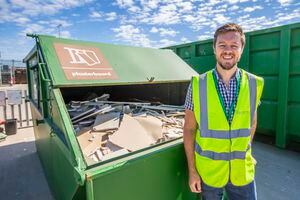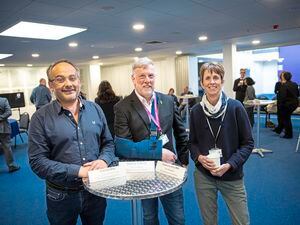More than 95% of households are kerbside recyclers - survey
THE POPULARITY of kerbside recycling has reached an all-time high, according to a survey carried out by the States, as islanders who switched to collections when bring-bank sites closed during lockdown have continued to use the service.

A recent survey of over 1,000 homes in two parishes found more than 95% of households are now regular kerbside pick-up users, up from the previous record of 74% just over two years ago.
Fortnightly glass pick-up was the biggest increase in the last 12 months with 69% of participating households setting out bottles and jars for collection, compared to 59% in 2019.
However actual participation in glass collections is believed to be even higher because many households have relatively little glass, so do not put it out as frequently as other materials.
The four-week survey may therefore not have captured all homes that use the service.
Waste prevention and recycling officer Ben Henry said the high participation levels were evidence of enthusiasm in islanders.
'The level of participation in Guernsey is consistently high compared to waste authorities elsewhere, which is one reason our recycling rate is among the highest in the world,' he said.
'The survey showed us once again just how keen islanders are to recycle and reduce what goes into their black bags.'
Each year the survey covers the same properties, comprising a mix of social housing and privately-owned or rented properties, and includes areas around central St Peter Port and coastal parts of Castel.
Staff from Guernsey Waste record what materials households set out over a four week period.

The survey found that 96% now use the kerbside blue or clear bags, compared to 92% in June 2019.
That increase is being attributed to islanders switching from using bring banks.
Food waste collections are proving equally popular, with 93% of households regularly using their caddy in the latest survey, on a par with last year.
This year’s survey also recorded the amount of materials in blue and clear bags which should not be in them.
Thin film plastics like carrier bags, bread wrappers, pet food pouches and crisp packets were among the most common.
These materials are not recycled because there are few facilities that can accept them, the processing is costly and energy intensive, and the resulting products are often low quality and low value. They should therefore be put in with general rubbish.
However they were found in around 10% of blue bags, mostly as small amounts.
Bags that were found to include this contamination were left behind with a sticker explaining what the issue was and what to do next, with contact details for further information. Most households were able to resolve the issue ahead of their next collection.
Contamination was far less common in clear bags, with the most likely items being tissues, kitchen roll or paper hand towels.
Mr Henry said quality was important for recycling.
'We need to ensure material we export for recycling is of good quality, otherwise there is a risk processors may reject it.
'That means trying to keep out [those incorrect] items.'
Efforts are being made to educate islanders as to what should and should not be put in their recycling.
Sometimes that requires Guernsey Waste to leave bags behind to draw attention to the issue - something that seems to work.
The amount of materials collected through kerbside recycling saw a big increase in the first half of 2020, which is thought to be due to lockdown when islanders were spending more time at home and bring-banks were shut.
Since islanders went back to work or school, and pubs and restaurants reopened, recycling tonnages have returned to pre-lockdown levels, but the amount being collected through bring-banks has fallen.





